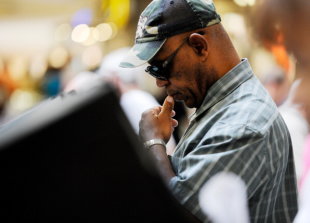 A man ponders his vote in Las Vegas. (David Becker/Getty)
A man ponders his vote in Las Vegas. (David Becker/Getty)
A barrage of attention from the presidential candidates and the news media has been paid to "waitress moms," "Walmart women" and other exhibits of the female species this election, with pundits wondering whether the female gender gap, which works in the president's favor, will carry him over the top on Election Day.
But the focus might be better spent on men.
"The issue is not the women's vote, but the men's vote," Frank Newport, Gallup's editor-in-chief, told Yahoo News. The reason: polls show male voters look much more likely to break from their 2008 voting patterns. If that happens, the men's vote could decide whether Barack Obama or Mitt Romney becomes the next president.
Four years ago, Obama won 49 percent of the male vote, buoyed by historic gains with white men, who chose the Democratic candidate in the highest proportions seen since Jimmy Carter. Even so, most white men—57 percent of them—still voted for John McCain, and a majority of such voters have not backed a Democratic candidate since 1964, when men began abandoning the Democratic party.
This year, Obama's inroads with white men have eroded. Worse, the candidate tracks in the low 40s among all men, not just white ones, in the latest ABC/Washington Post polls. It's possible the president will have lost up to 9 points of ground among male voters compared to 2008. No Democratic candidate has been elected in the past 50 years without gaining close to half of the male vote.
Why are some men abandoning Obama? It's open to interpretation, but one fairly straightforward theory from Newport is that male voters rate Romney higher on the issues that they say are most important: jobs, the economy and the deficit.
Another theory, laid out in a study by Texas A&M political science professor Paul Kellstedt, is that over the past 30 years men have been more likely to shift rightward during economic downturns, supporting conservative candidates who vow to cut back on government spending. Women also shift rightward in response to a faltering economy, but they are more likely than men to support social safety net programs, and thus much less likely to support a candidate who wants government cuts.
On average, men and women think about the role of government in a fundamentally different way, notes the Democratic pollster Celinda Lake. That difference accounts for one of the biggest shifts in party identification in the past 50 years.
Beginning in 1964, but intensifying with Ronald Reagan's first presidential election, men began leaving the Democratic party and voting Republican. The major causes of the shift were attitudes on both government spending and war, according to the Rutgers political scientist Susan Carroll. For the most part women, who in surveys are not only consistently much more wary of government cutbacks than men, but also much less likely to support foreign military interventions and wars, stayed with the Democrats.
It was men, not women, who changed the political landscape by changing their votes, and women who have been the political stalwarts.
It still makes sense, however, for Romney and Obama to make overt appeals to women. (And to give them fervent shout-outs during debates and party conventions.) According to Lake, women make up about 60 percent of undecided voters this election, which is higher than their projected share of the electorate, 52 percent. And in past elections' exit polls, more women than men said they made up their minds about whom to vote for in the last week before an election.
Still, according to the ABC News/Washington Post pollster Gary Langer and other experts, female voters are not expected to change their votes, on average, significantly from 2008, when they were seven percentage points more likely than men to vote for Obama. This is despite a few recent polls suggesting Romney may be closing in on Obama's support with women. (The Obama campaign has been quick to dismiss these polls.)
"I think it's going to end up in that ballpark. I don't expect it will look vastly different," Carroll said of the gender gap.
Forget war on women: Men’s vote could decide who wins the White House
This article
Forget war on women: Men’s vote could decide who wins the White House
can be opened in url
http://landnewster.blogspot.com/2012/11/forget-war-on-women-mens-vote-could.html
Forget war on women: Men’s vote could decide who wins the White House










